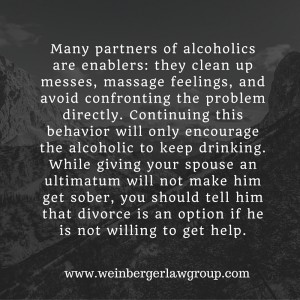Alcohol And Divorce: Last Call On Your Marriage
 A 2007 study by the Rand Organization found that alcoholics are more likely to get divorced than non-alcoholics. According to the research, alcohol is the primary cause of divorce in couples under thirty. The chaos caused by excessive drinking – legal trouble, job loss, financial woes, health issues – can make life with an active alcoholic feel unmanageable. As the problem drinker’s condition deteriorates, the spouse slips into perpetual crisis management mode as she struggles to maintain the family’s financial and psychological equilibrium. Are your marriage problems being fueled by alcohol addiction? Here are some more sobering facts about the cost of not being sober:
A 2007 study by the Rand Organization found that alcoholics are more likely to get divorced than non-alcoholics. According to the research, alcohol is the primary cause of divorce in couples under thirty. The chaos caused by excessive drinking – legal trouble, job loss, financial woes, health issues – can make life with an active alcoholic feel unmanageable. As the problem drinker’s condition deteriorates, the spouse slips into perpetual crisis management mode as she struggles to maintain the family’s financial and psychological equilibrium. Are your marriage problems being fueled by alcohol addiction? Here are some more sobering facts about the cost of not being sober:
- Alcohol is the #1 drug problem in the U.S.
- There are more than 12 million alcoholics in the U.S.
- Given that alcoholism impacts the families of the alcoholic, it is estimated that 40-50 million people in this country are affected.
- The divorce rate among alcoholics is four times that of non-alcoholics.
The stress of dealing with an addict’s erratic behavior exacts an enormous toll on family members, who often feel that they have to walk on eggshells to keep from upsetting the alcoholic and “making” him drink. Because so much energy goes into putting out fires or compensating for an under-functioning alcoholic, many spouses become depressed, anxious, and resentful. Children, in turn, feel neglected because the non-alcoholic parent has to focus all her attention on the parent who drinks.
Alcohol addiction can lead to divorce, but not all marriages where alcoholism is a factor are doomed. Depending on the alcoholic’s level of functioning, the problems might be remediated with effort. As long as abuse is not present, and there is no imminent threat of danger, the alcoholic’s spouse should pause before pulling the plug on the marriage. Here are some tips for anyone contemplating divorce from an alcoholic.
Be honest with your spouse about the outcome of his drinking. Many partners of alcoholics are enablers: they clean up messes, massage feelings, and avoid confronting the problem directly. Continuing this behavior will only encourage the alcoholic to keep drinking. While giving your spouse an ultimatum will not make him get sober, you should tell him that divorce is an option if he is not willing to get help.
Ask him to attend Alcoholics Anonymous. Most alcoholics need support to quit drinking. Tell her you would like her to try this 12-step program. Look online and find some nearby meetings at http://www.aa.org/. Recognize that AA requires a substantial commitment, so if she does decide to go, understand that she will be spending time away from you and your family and support her recovery.
Attend Alanon. Codependent spouses are so busy focusing on the alcoholic that they’re often blind to their own issues. But if your marriage is going to change, you must change as well. Alanon is a 12-step program for anyone affected by alcoholism. No, you can’t make your spouse stop drinking, but you can get help on how to deal with his drinking. Members learn to recognize and address their enabling behaviors, build self-esteem, and establish an identity apart from the alcoholic.
Arrange An Intervention. If your spouse’s drinking is severe, and he refuses to admit his life is unmanageable, you need to arrange an intervention to get him to rehab. This is not about trying to control your spouse, but rather, to save his life. In an intervention, friends and relatives gather to confront the alcoholic about his problem, tell him how it’s affected them, and what will happen if he doesn’t stop drinking. A representative from a rehab facility is usually present to take the alcoholic to rehab if he’s willing.
Therapy. Talk to a mental health professional before making the life-changing decision to end your marriage. You want to make sure you did everything you could to save it before filing for divorce – especially if you have children.
Is alimony a factor in your divorce? Our attorneys provide confidential legal guidance on how to best move your divorce forward. Please contact us for an initial attorney consultation.


